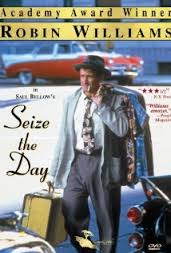
SEIZE THE DAY
US, 1986, 93 minutes, Colour.
Robin Williams, Joseph Wiseman, Glenne Headly, Jerry Stiller.
Directed by Fielder Cook.
Seize the Day is based on a novel by Saul Bellow. It is set in the '50s, especially in New York City.
Robin Williams is quite effective as Tommy, a Jewish man whose marriage has broken up, who is defiant and has lost his job as a salesman when his boss gave part of the territory to a relative, tries to get employment, gets tangled with a con doctor and loses money on the stock exchange, tries to relate to his arrogant and hard father. The film uses Williams' manic style - generally under control but breaking out in desperation. (This film preceded Williams' performances in Good Morning Vietnam, Dead Poets Society, Cadillac Man and Awakenings.)
Joseph Wiseman is very effective as the cruel and cold father. Jerry Stiller is particularly good as the doctor with his confident mouthing of psychology and business deals. The direction is by Fielder Cook, director of many distinguished telemovies.
1. Impact of the film? Telemovie for public broadcasting? Its intended audience - art television? Saul Bellow and his status as an American novelist, in American literature? The film as a piece of Americana?
2. The re-creation of the '50s, New York City, the country? America in the Eisenhower era? The musical score?
3. The title, the advice to Tommy by Tamkin? Its ironies and Tamkin's success? Tommy's failure?
4. Robin Williams' portrait of Tommy: in himself, age, experience, the salesman who was the victim of family promotion? His long marriage and his children? His leaving? His relationship with Olive and her love for him? The confrontation with the boss and leaving? Word getting around? His need for money? Psychological depression, mania? Being fobbed off for jobs? Not getting interviews, hearty talk and no action? The meal with Bernard (Tony Roberts in a cameo) and his not being able to give him a job, bargaining about salary?
5. His poor self-image, from his father, memories of his mother and the visit to the cemetery? Depression? His father spurning him? Talk at the meals? Having to pay the bills?
6. His friendship with Dr Tamkin, cultivating him, playing cards and gambling, questions of money and style? Tamkin and Dr Adler's hostility? The Wall Street plans, making money, persuasive talk for Tommy, the visits to the stock exchange, Tommy's nerves and watching the sales, the prices? The range of buyers, the frenzy in the exchange? The old man concerned about wheat, his story, Tommy helping him across the street - the meals, Tamkin's boorish eating? Tommy's questioning himself about being in contact with this man? The loss of the money? Tamkin's disappearance?
7. Tamkin and his style, his inventions, relationships with women, helping people - and the maid calling him a saint? The conman, persuasive talk, his style, disappearance?
8. The growing despair, Tommy talking with his father, his father's disdain, not liking him? Pleading for love, affection, for some kind of help?
9. Dr Adler and his coldness, self-centred life, fear of death, talking about illness, telling lies about Tommy's success? Spurning of his artist daughter? Holding on to his money? Not wanting to be tricked? The discussion with the businessman (William Hickey in a cameo)? His sternness, the final confrontation in the sauna? Unrelenting?
10. The phone call from Margaret, her hatred of Tommy, for walking out, her demands for money? The children, the boy asking his father about remarrying, the other one not wanting to talk to him?
11. The bond with Olive, her love and friendship, the phone calls, her support?
12. Going to the Jewish funeral, the Jewish talk (and memories of his mother at the cemetery and the singer asking for a donation)? The women commenting and giving him support?
13. An ironic view of the American dream?